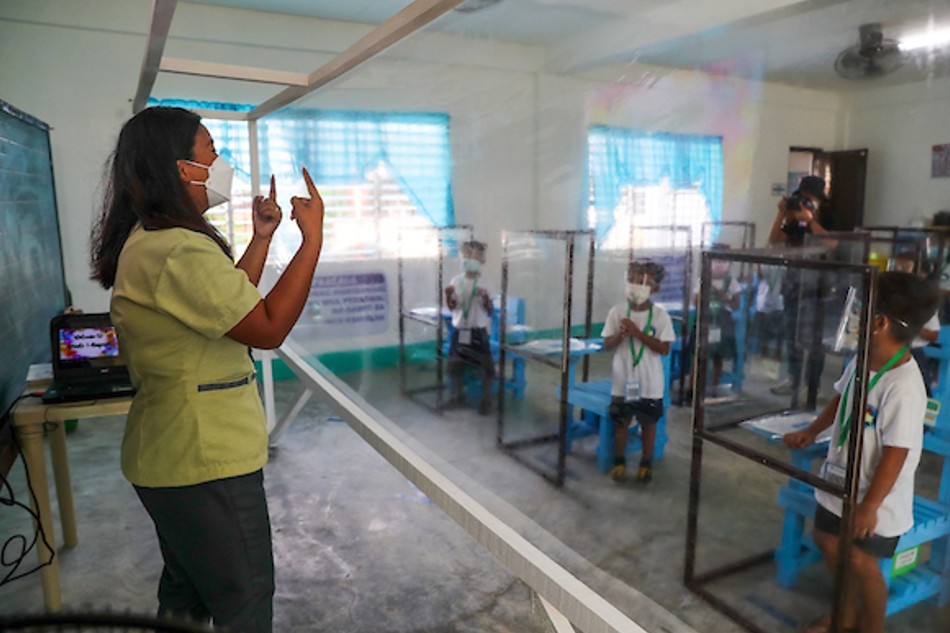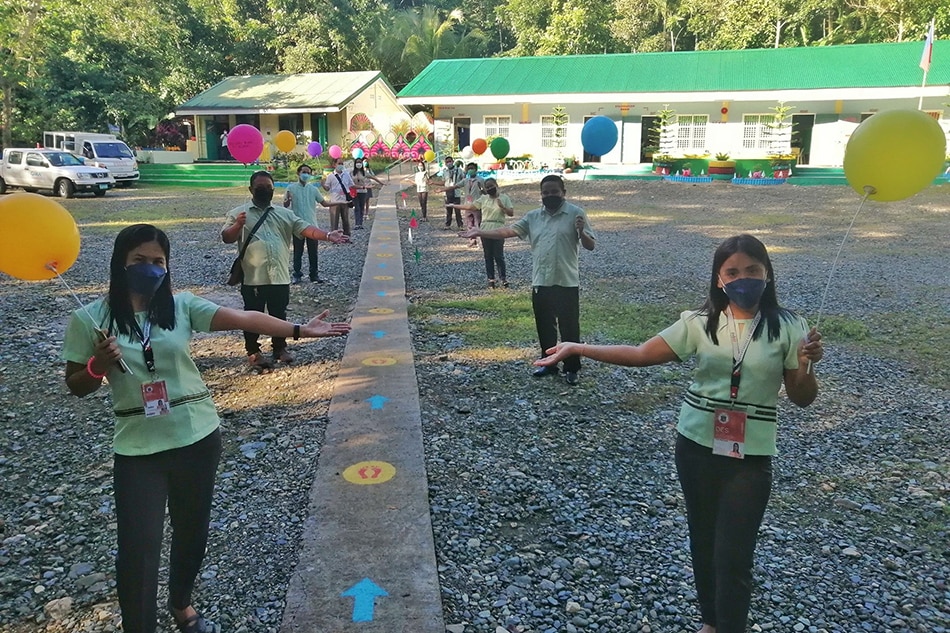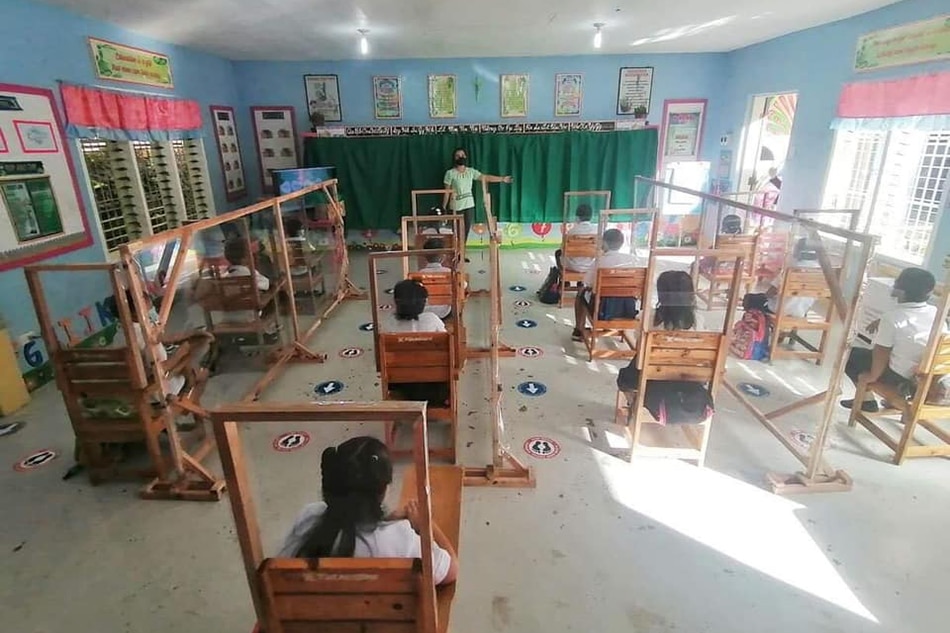Public school students back in classrooms for pilot in-person classes | ABS-CBN
ADVERTISEMENT

Welcome, Kapamilya! We use cookies to improve your browsing experience. Continuing to use this site means you agree to our use of cookies. Tell me more!
Public school students back in classrooms for pilot in-person classes
Public school students back in classrooms for pilot in-person classes
Jaehwa Bernardo,
ABS-CBN News
Published Nov 15, 2021 12:07 PM PHT
|
Updated Nov 15, 2021 05:24 PM PHT
MANILA (UPDATE) — Select public schools in the Philippines reopened to some students on Monday as the country began its pilot implementation of limited in-person classes, the first time that learners attended classroom sessions after nearly two years of distance learning due to the COVID pandemic.
MANILA (UPDATE) — Select public schools in the Philippines reopened to some students on Monday as the country began its pilot implementation of limited in-person classes, the first time that learners attended classroom sessions after nearly two years of distance learning due to the COVID pandemic.
This makes the Philippines the last country in the world to return to in-person classes after Venezuela reopened schools in late October. Last September, the two were identified by the United Nations Children’s Fund as the countries that have yet to resume face-to-face instruction since the health crisis began in early 2020.
This makes the Philippines the last country in the world to return to in-person classes after Venezuela reopened schools in late October. Last September, the two were identified by the United Nations Children’s Fund as the countries that have yet to resume face-to-face instruction since the health crisis began in early 2020.
“We are happy to see our learners inside our classrooms as we recognize the significance of face-to-face learning in their social development,” the Department of Education (DepEd) said in a statement.
“We are happy to see our learners inside our classrooms as we recognize the significance of face-to-face learning in their social development,” the Department of Education (DepEd) said in a statement.
“In the coming weeks, more learners in public and private schools will follow suit as the President approved to increase the number of pilot participants,” it added.
“In the coming weeks, more learners in public and private schools will follow suit as the President approved to increase the number of pilot participants,” it added.
ADVERTISEMENT
An initial 100 public schools were allowed to join the dry run but 3 schools in Zambales postponed the start of their in-person classes after some teachers tested positive for COVID-19 through antigen tests.
An initial 100 public schools were allowed to join the dry run but 3 schools in Zambales postponed the start of their in-person classes after some teachers tested positive for COVID-19 through antigen tests.
Private schools, meanwhile, are scheduled to begin their in-person classes on Nov. 22.
Private schools, meanwhile, are scheduled to begin their in-person classes on Nov. 22.
Only students from Kindergarten to Grade 3 and senior high school are joining the pilot run, which is voluntary and takes place in schools from areas deemed “low risk” for COVID-19, based on the guidelines crafted by the DepEd and the Department of Health.
Only students from Kindergarten to Grade 3 and senior high school are joining the pilot run, which is voluntary and takes place in schools from areas deemed “low risk” for COVID-19, based on the guidelines crafted by the DepEd and the Department of Health.
The DepEd could not immediately say how many public school students are participating in the pilot run but its planning services director, Roger Masapol, gave an initial estimate of about 8,000 learners.
The DepEd could not immediately say how many public school students are participating in the pilot run but its planning services director, Roger Masapol, gave an initial estimate of about 8,000 learners.
“Assuming na pumayag ‘yong lahat ng magulang ng mga kabataang ‘to na nasa Kinder to [Grade] 3, we expect more than 8,000 [students] sa 100 [pilot] schools,” he told ABS-CBN's TeleRadyo on Monday.
“Assuming na pumayag ‘yong lahat ng magulang ng mga kabataang ‘to na nasa Kinder to [Grade] 3, we expect more than 8,000 [students] sa 100 [pilot] schools,” he told ABS-CBN's TeleRadyo on Monday.
ADVERTISEMENT
(Assuming that all parents of these students from Kinder to Grade 3 allowed them to join the pilot implementation, we expect more than 8,000 students in these 100 pilot schools.)
(Assuming that all parents of these students from Kinder to Grade 3 allowed them to join the pilot implementation, we expect more than 8,000 students in these 100 pilot schools.)
HEALTH PROTOCOLS IN PLACE
Participating schools retrofitted their facilities to implement protocols against the spread of COVID-19.
Participating schools retrofitted their facilities to implement protocols against the spread of COVID-19.
At Longos Elementary School in the northern city of Alaminos, Pangasinan, an initial 40 Kindergarten to Grade 3 students attended the first day of limited in-person classes.
At Longos Elementary School in the northern city of Alaminos, Pangasinan, an initial 40 Kindergarten to Grade 3 students attended the first day of limited in-person classes.
Next week, the first batch of students will study again from their homes via distance learning while another batch of students will attend in-person classes. These two batches will be alternating between physical classes and remote learning, which will also be the setup in other participating schools.
Next week, the first batch of students will study again from their homes via distance learning while another batch of students will attend in-person classes. These two batches will be alternating between physical classes and remote learning, which will also be the setup in other participating schools.
Upon entering the school’s premises, students are checked for their body temperature, required to fill out a health declaration form, and proceed to handwashing stations before going to their classrooms.
Upon entering the school’s premises, students are checked for their body temperature, required to fill out a health declaration form, and proceed to handwashing stations before going to their classrooms.
ADVERTISEMENT
The school enforced distancing among students’ chairs and installed plastic barriers around each of them.
The school enforced distancing among students’ chairs and installed plastic barriers around each of them.
During recess time, students were given meals that they ate on their respective seats. They were not allowed to leave their seats unless they needed to go to the restroom.
During recess time, students were given meals that they ate on their respective seats. They were not allowed to leave their seats unless they needed to go to the restroom.
Alaminos Mayor Bryan Celeste said the local government would provide all the needs of the school.
Alaminos Mayor Bryan Celeste said the local government would provide all the needs of the school.
Local officials are also prepared to help the school in case of a COVID-19 outbreak, he said.
Local officials are also prepared to help the school in case of a COVID-19 outbreak, he said.
“Nandyan ang ating city health office, barangay council, teachers to contain the situation,” he said.
“Nandyan ang ating city health office, barangay council, teachers to contain the situation,” he said.
ADVERTISEMENT
(Our city health office, barangay council and teachers are there to contain the situation.)
(Our city health office, barangay council and teachers are there to contain the situation.)
There are four active COVID-19 cases in Alaminos, but Sitio Longos, where the school is located, has zero infections.
There are four active COVID-19 cases in Alaminos, but Sitio Longos, where the school is located, has zero infections.
Education Secretary Leonor Briones earlier instructed participating schools to prepare contingency plans in case a student or teacher exhibits symptoms of COVID-19 or tests positive for the disease.
Education Secretary Leonor Briones earlier instructed participating schools to prepare contingency plans in case a student or teacher exhibits symptoms of COVID-19 or tests positive for the disease.
ZAMBALES SCHOOLS
The DepEd's office in Zambales province said it postponed the start of in-person classes in 3 of the 10 pilot schools.
The DepEd's office in Zambales province said it postponed the start of in-person classes in 3 of the 10 pilot schools.
Two of the schools, located in San Marcelino town, deferred from holding physical classes after some faculty members tested positive in COVID-19 antigen tests conducted last Sunday.
Two of the schools, located in San Marcelino town, deferred from holding physical classes after some faculty members tested positive in COVID-19 antigen tests conducted last Sunday.
ADVERTISEMENT
A school in San Felipe town also suspended the start of in-person classes pending the results of teachers' COVID-19 tests.
A school in San Felipe town also suspended the start of in-person classes pending the results of teachers' COVID-19 tests.
The local DepEd office assured that "classes will begin in these schools once the teachers and other personnel will have a negative result."
The local DepEd office assured that "classes will begin in these schools once the teachers and other personnel will have a negative result."
In Balamban, Cebu, teachers of the mountain school Cabagdalan Elementary School held balloons as they lined up at the campus entrance to welcome students.
In Balamban, Cebu, teachers of the mountain school Cabagdalan Elementary School held balloons as they lined up at the campus entrance to welcome students.
The pilot implementation is the first in the government’s three-phased plan to reopen basic education schools after the pandemic led to closures and a shift to a distance learning setup that has proved to be challenging for many students, parents, and teachers.
The pilot implementation is the first in the government’s three-phased plan to reopen basic education schools after the pandemic led to closures and a shift to a distance learning setup that has proved to be challenging for many students, parents, and teachers.
The expanded phase, under which more schools or grade levels will be allowed to hold in-person classes, is scheduled to start in March 2022.
The expanded phase, under which more schools or grade levels will be allowed to hold in-person classes, is scheduled to start in March 2022.
— With reports from Arra Perez and Benise Balaoing, ABS-CBN News and Annie Perez
Read More:
education
basic education
public schools
face-to-face classes
pilot face-to-face classes
Department of Education
distance learning
School Year 2021-2022
Longos Elementary School
Alaminos
ADVERTISEMENT
ADVERTISEMENT






